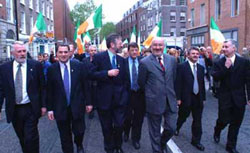 |
Irisch
Republikanische Solidarität
|
 |
TRIMBLE CRITICISED FOR TALKS WALK-OUT
The crisis in the political process has deepened following the
withdrawal of Ulster Unionist leader David Trimble from the
formal review of the 1998 Good Friday Agreement in Belfast.
Trimble accused the British government of "rank moral cowardice"
over its failure to take action agaisnt Sinn Fein for alleged
activity by the Provisional IRA.
He is holding discussions with British Prime Minister Tony Blair
today to discuss the matter and it is understood he is being
persuaded to return.
However, Ian Paisley's DUP, which traditionally boycotts talks
involving Sinn Fein, have said they will remain in the review.
The UUP and DUP are now accusing each other of hypocrisy.
Both British and Irish governments are trying to put on a brave
face about the review process, which several commentators have
described as 'failing'.
Attention has certainly switched to Downing Street for the
moment. Sinn Fein president Gerry Adams and chief negotiator
Martin McGuinness were in London yesterday for talks, while the
SDLP and DUP will also have meetings with Tony Blair later this
week, or early next week.
The governments indicated they were not at all surprised by the
UUP withdrawal and British officials said it was regrettable, but
that the review would continue.
Following the alleged abduction attempt on a republican
disssident at a Belfast bar last week -- blamed by PSNI police
chief Hugh Orde on the Provisional IRA -- unionists have focussed
exclusively on the issue of paramilitarism.
Mr Trimble said that the government had to show quite clearly to
the paramilitaries that it will not tolerate continued breaches
of the peace.
The UUP leader said that until there was action by the
governments his party was “out of the current review”. It would
not be business as usual.
The UUP’s Michael McGimpsey claimed that most of the things in
the Good Friday Agreement were in place, except establishing
non-violence.
“Eventually that will happen – when the Provos give up on the
IRA,” he said.
The DUP’s Jeffrey Donaldson said that his party was staying in
the review because it had been given a mandate to renegotiate the
Good Friday Agreement. The former UUP MP, who recently switched
to Paisley's grouping, was highly critical of his former party
leader.
“I simply can not understand why David Trimble allows the IRA to
dictate his strategy. Why is it that every time the IRA does
something David Trimble alters course?” he asked.
“We will continue with our engagement with the constitutional
parties and the government about the issues that are important.
We are not going to allow the IRA to dictate the terms.
“It is up to the government now to deal with the IRA. We have a
policy of not engaging with Sinn Fein in these negotiations, nor
will we.
“Rather than doing what he (Mr Trimble) has done today, which is
a rather foolish move on his part, he would have been better
talking with the other parties and ignoring Sinn Fein until such
times as the IRA deals with the issue of terrorist activity,” Mr
Donaldson added.
Sinn Fein told the governments that it and the unionists need to
take the issue of ongoing sectarian attacks and killings across
the north more seriously than they have done.
Bairbre de Brun said: “Unionist political leaders need to take
their responsibility seriously to use their influence to bring an
end to sectarian attacks.”
She said that Sinn Fein had presented a dossier of sectarian
attacks to the governments.
“The reality is that the IRA poses no threat to the peace
process,” Ms de Brun said.
Meanwhile, the moderate unionist Alliance party appears
increasingly aligned to the Ulster Unionist Party. Party leader
David Ford has said that if the British government did not state
what sanctions it proposes to take against parties linked to
groups involved in paramilitary activity, there was little point
in having review meetings focusing on paramilitarism.
Both Alliance and the UUP have sought a report from the
Independent Monitoring Commission as soon as possible. The
body, set up to monitor the actions of paramilitary groups and
mete out political sanctions, was the only element of last year's
Joint Declaration by the two governments to be implemented.
Other political parties in the North were critical about Mr
Trimble's decision. Peter Robinson, the DUP deputy leader, called
it "political hokey-cokey".
The DUP has made its own proposals for immediate sanctions
against Sinn Fein. It has said all allowances and privileges for
Sinn Fein at the Stormont Assembly and Westminster parliament
should be cut off.
Describing Mr Trimble as a "lame duck leader of a party in
terminal decline", DUP leader Ian Paisley said the UUP leader was
trying to hand a veto to the IRA by calling for a unionist
boycott of the review.
Mr Paisley said the British government should expel Sinn Fein
from talks, curtail its funding and accommodation at Westminster
and specify the IRA once again as an illegal organisation.
But speaking after his meeting at Downing Street, Mr Trimble said
the review could have no credibility until republicans
demonstrated they had abandoned violence.
"There is no point continuing with the review when it is clear
that the underlying problem is not resolved and indeed that the
republicans have not come to the point of making the crucial
decision and change towards peace and democracy," he said.
He renewed his call on the Prime Minister to throw Sinn Fein out
of the talks.
"In this situation there is a duty on him (the Prime Minister) to
act. Failure to act will render the present process nugatory."
Letzte Änderung:
06-März-04